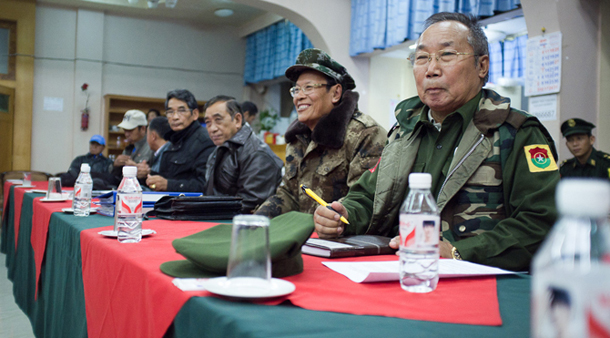The Kachin Independence Organization (KIO) has agreed to the Burmese government’s proposal of Ruili as the venue for the next round of peace talks, but has yet to fix a date for the negotiations.
Speaking to The Irrawaddy on Wednesday, James Lum Dau, the KIO’s deputy chief of foreign affairs, said, “We agreed to meet in Ruili because it is a neutral venue, neither under the control of the government nor the KIO.
Riuli is a border town in China’s Yunnan Province. It stands opposite the town of Muse in northern Shan State.
The government previously rejected in August a proposal by the KIO to hold a meeting in Ruili, saying that the deputy army chief in Burma, Soe Win, could not travel to another country for official negotiations. The government responded by inviting the KIO to the capital, Naypyidaw, an offer spurned by the Kachins who said that such a rendezvous was “inappropriate” while fighting continued unabated in their homeland.
James Lum Dau said that the KIO central committee was currently meeting at the group’s headquarters in Laiza, Kachin State, to propose dates and an agenda for the fourth round of talks. “The KIO wants to have peace,” he said.
According to Hla Maung Shwe, a peace broker accompanying the Burmese government delegation, the KIO has yet to respond to Naypyidaw’s proposal last week that a fourth round of talks be scheduled at the Sino-Burmese border.
“We are still waiting for their response. We expect an answer either today or tomorrow,” Hla Maung Shwe said on Wednesday morning, adding that he wanted to see a more positive outcome from this round of talks.
The KIO has already met three times with a government delegation, but without any concrete results.
“We are all from the same country and should not be fighting each other,” said Hla Maung Shwe.
However, several Burma watchers have expressed doubts as to Naypyidaw’s sincerity in pursuing peace with the Kachin rebels. Many point to the fact that hostilities are ongoing between the sides in Kachin State and northern Shan State, and that the Burmese army stands accused of human rights abuses, rape and the murder of civilians.
The Burmese government and its cronies are also accused of seeking to control the rich natural resources in northern Kachin State, in particular jade and gold, which is being increasingly mined in the region.
One of the main unresolved issues between the groups appears to be the failure to reach an agreement on the withdrawal of troops from frontlines, and the withdrawal from bases in KIO-controlled territory of Burmese army units.
Hostilities broke out between government troops and the KIO in June last year, ending a 17-year ceasefire. The fighting has forced about 75,0000 villagers from their homes, many of whom are sheltering in refugee camps at the Chinese border.
The KIO has reported that it killed 211 government troops during the months of August and September around Hpaka Township. It said that 105 acts of engagement occurred between the armies in September alone.

















